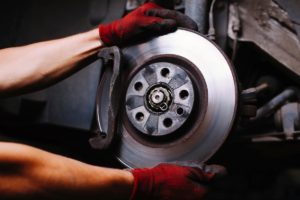
6 Signs You Need A Brake Job
- Thin brake pads
- Vibrating break pedal
- Brakes make grinding noise
- Brakes making clicking noise
- Brakes making screeching sound
- Car is pulling to one side when applying the brakes
Why Should You Change your Brakes?
Brakes are an essential safety feature on every car. With regularly having to change them, a lot of people try to understand why. The reasons are driving habits and driving conditions. These two determine how often the brakes on your car need to be changed. Living in urban areas, like Los Angeles, requires the car to stop-and-go more often than a car that drives long highways, like out in the countryside. To put it into perspective, driving 100,000 miles on an open road requires the vehicle to stop a lot less than a vehicle that drives around in the city. City drivers encounter stop signs or traffic lights at every block, forcing the car to apply on the brakes a lot more frequently.
A quick tip, which can make things easy to remember, is having the brakes checked every 6 months along with your vehicles tire rotation. It makes it easy for some, knocking two birds with one stone.
More modern vehicles have brake sensors to let the driver know when it’s time to have the brakes looked at. After reaching a certain point, some start scraping the rotors making a unique screeching sound. More commonly today, brake sensors are attached to the brake pads, wearing down alongside them. After passing a certain point, the sensor breaks the circuit to the ECU (engine computer), letting the driver know through the on board information system or instrument cluster that it’s time for a brake job. If ever a brake light shows up, don’t confuse it with the parking brake light that appears every time the parking brake is applied. The brake light is an indication for the car having low brake fluid and requires maintenance.
Your car might show symptoms. These should be taken seriously and can be one or more of the following: squeaks, squeals, and grinding. These are all bad signs and should immediately let you know it’s time for the brakes to be inspected, probably changed. A pulsation or vibration felt through the brake pedal or the sinking of the pedal when applied are all warning signs as well. Have your mechanic inspect your brakes to make sure everything is working properly.
Can I Resurface Rotors?
Call Us
323.580.6368
Let us answer any of your questions!
email: info@mezianmotors.com
Fax: 323.937.9969
Business Hours
| WEEK DAYS: | 8:00 AM – 6:00 PM |
| SATURDAY: | 8:00 AM – 2:00 PM |
| SUNDAY: | CLOSED |
